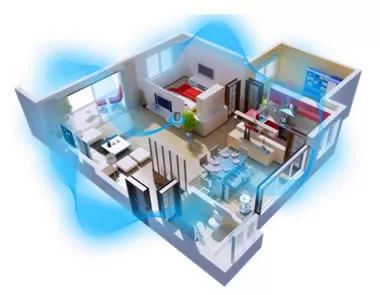From 1984 when the world's first "smart building" was settled in Connecticut, the United States, to Shenzhen's first agency for the US X-10 retailer in 1994, and now smart products are everywhere, the concept of "smart home" is quietly emerging around us Pieces of smart hardware have entered the living room, gradually improving the safety, convenience and comfort of the home.
After more than 20 years of growth and development, China's smart home has come to the second crossroads of industrial development. On the one hand, consumers are "buying good or not", and on the other hand, they are investing huge amounts of money in the market. How to choose a smart home? Where should I go? Can fish and bear paws have both? If you want to get the answer, you have to return to the essence and original intention of the smart home.

The budding stage: home automation is dominant
Compared with other technology industries, China's smart home industry started not later than abroad.
In 1994, China's smart home entered a budding stage. At that time, there was no enterprise specializing in smart home manufacturing, but the entire industry's familiarity with smart concepts and product recognition is very fast.
When smart homes first appeared, home automation was even equivalent to smart homes.
At that time, two of the earliest domestic smart home companies appeared in Shenzhen. Their business was mainly agent for smart home products imported from the United States, and the agent products were the famous American home automation system X-10. The system mainly uses micro-processing electronic technology to integrate or control electronic appliances or systems in the home. Strictly speaking, it is not "smart home", but "home automation".
From 2000 to 2005, with the rapid development of real estate, the home furnishing market has grown stronger, and smart homes have also ushered in a broader development space. More than 50 smart home R & D and production enterprises have appeared in China. However, these companies lack the core technology and can only keep up with the pace of foreign products. They have always been centered on the overall automation system, and their customers are concentrated in high-end hotels, high-end residential areas, foreign enterprise buildings and other high-end markets. The entire smart home market is like a "loft in the sky", and it has passed the period of no one's attention.
Nonetheless, these toddler smart home companies have achieved impressive results. Nowadays, the lighting and home appliance automation functions in some high-end hotels are upgraded from the original system. It can be said that the concept of China's smart home is through the automation experience of these high-end hotels, from the reputation of one customer after another, into the general public's vision. In this word-of-mouth process, discussions on the nature of smart homes have not been interrupted. Is automation intelligent? What is intelligence? This has always been a core issue in the industry.

The first intersection: automatic or intelligent?
"Suddenly as a spring breeze came," China's Internet industry bloomed in 2006 and continued to affect more and more traditional industries. It was also this year that network technology promoted the comprehensive transformation of the home appliance industry, and a new form of traditional home appliances-network appliances / information appliances debut. The smart topic of the Chinese home furnishing industry seems to have a new answer: Internet + smart home appliances.
At this time, foreign smart home brands have entered the Chinese market, and their advanced smart technologies and single products have once again opened the eyes of the Chinese people. The original smart home can still be like this! Smart home brands currently active in the market, Legrand, Honeywell, Schneider, Control4, etc. all entered the Chinese market during this period. Their concepts and products are the embryonic form of today's smart home appliances. Chinese smart home companies play an inspiring role.
This is the first crossroad of development faced by China's smart home industry, which is basically an understanding of the concept of smart home. Is it to stick to the original mature automation system? Or open up a new smart home experience? Obviously, they chose the latter, and the market accepted this answer.
During this big industry discussion, some automated home furnishing companies that lacked core technology gradually withdrew from the market. The surviving companies have gradually found their own development directions and promoted the process of their intelligent products. For example, our well-known Tianjin Ruilang, which focuses on home appliance control and network appliances; Qingdao Airhouse, has created five AiHouse control systems; traditional home appliance brand Haier uses U-home system as a platform to realize the interconnection of things ... The leading brands are all companies that successfully transformed at that time.
This stage of reshuffle lasted until 2010, China's smart home industry finally formed the benefits of industrial clusters, and appeared in a new posture. So far, China's smart home industry has successfully switched from an integrated automation system to smart single products, and is poised to compete for the admission ticket of the smart home market.
Explosion stage: market craze
Since entering 2010, the smart home industry has finally ushered in the best era. The huge amount of capital in the investment market, the widespread concern of the society, and the support of relevant national policies, the most important thing is the change in the concept of ordinary consumers, which has contributed to the rapid development of the smart home industry.
On the international front, tech giants have rushed to the “new blue ocean†of smart homes, triggering a global investment boom in the industry.
In 2010, Nest, the world's first smart home furnishing product, was born.
In 2012, SmartThings smart home wireless suite raised $ 1.2 million.
In 2013, LG, Panasonic and Qualcomm participated in the world's first smart home interconnection technology alliance.
In January 2014, Google denounced Nest, a smart home company acquired for $ 3.2 billion. In the second half of the same year, Samsung acquired SmartThings for US $ 200 million, Apple also released the HomeKit platform, and Amazon launched the smart home hardware Echo ...
Domestically, the three major camps of traditional home appliance companies, consumer electronics cross-border companies, and Internet companies entered the battle, and the scale of the smart home industry continued to expand.
In 2014, the market scale of China's smart home industry reached 29 billion yuan; in 2015 it was 40.34 billion yuan, an increase of 41% year-on-year; in 2017, China's smart home market will reach 90.8 billion yuan. In just six or seven years, the smart home industry has gone from tepid to enthusiastic, which is undoubtedly the best era.

At the same time, this is also the worst era. Under the enthusiasm of the market, smart home companies are becoming more and more impetuous, and the most direct performance is the “pseudo-smart†products that have been criticized.
Let's take a look at a few smart home items that are beyond description.
The first is the intelligent chopsticks "Chopsticks Search" launched by Baidu. The sensor at the bottom of it can detect information such as grease and salt, and remind users through Bluetooth and mobile phones synchronously whether the products they eat are healthy.
The second one is Nemo Coaster smart coaster, which can measure water temperature and volume, record drinking habits through mobile phone, and remind users to drink water on time. There is also a smart egg box priced at 665 yuan, which tells the kitchen lady how fresh each egg is through sensors and mobile phone software.
Finally, there is the Dream Flower smart vase, which is a vase integrating gateway, wireless router, temperature and humidity sensor, CO2 sensor, adjustable colorful lights, PM2.5 detection, noise detector and other equipment ...
These inexplicable smart home items are all released for sale in 2014-2016. All of these smart home items need to be used and identified by mobile phones. The so-called smart functions are also forcible stuffing and stacking. They make the actions of people eating, drinking, and frying eggs extremely complicated. The functions seem to be very intelligent, but they are not practical and convenient to use.
The fact is the same, these products have not been widely recognized by the market, and soon disappeared under the shine of conventional products such as smart speakers, smart door locks, and smart home appliances. The current situation of applause and cursing has also caused many smart home companies to start to think coldly and redefine the concept of smart home. The smart home industry has ushered in the second crossroads of development-the breakthrough stage.
The second crossroads: return to the original heart in the breakthrough stage
On the one hand, consumers are applauding products, and on the other, the investment market's enthusiasm for smart concepts. Today's situation makes smart home companies difficult.
In fact, the dilemma is not only unique to smart homes. The current emerging industries such as VR, biometrics, and smart transportation are all looking for their own ways. Even in the development of smart phones, more than one discussion of high-priced machines and low-priced machines.
To change the "difficulty in right and left" into a "right and left", the author believes that the original intention is the key. The original intention of the home is to create a more comfortable life, then the original intention of the smart home should be to create an intelligent life experience. The intelligence that people need should be a practical solution to practical needs, and a convenient and fast humanized experience. This should be the bottom line of smart home companies, and it is also a responsibility.
At the moment, smart homes are at dawn. Looking back at the beginning of the heart, firmly believe in your precious, do what you do, listen to your heart, you can ask West East.
Leakage Current Sensor,Dc Leakage Sensor,Dc Screen Leakage Detection,Closed Loop Dc Leakage Sensor
Zibo Tongyue Electronics Co., Ltd , https://www.tongyueelectron.com
